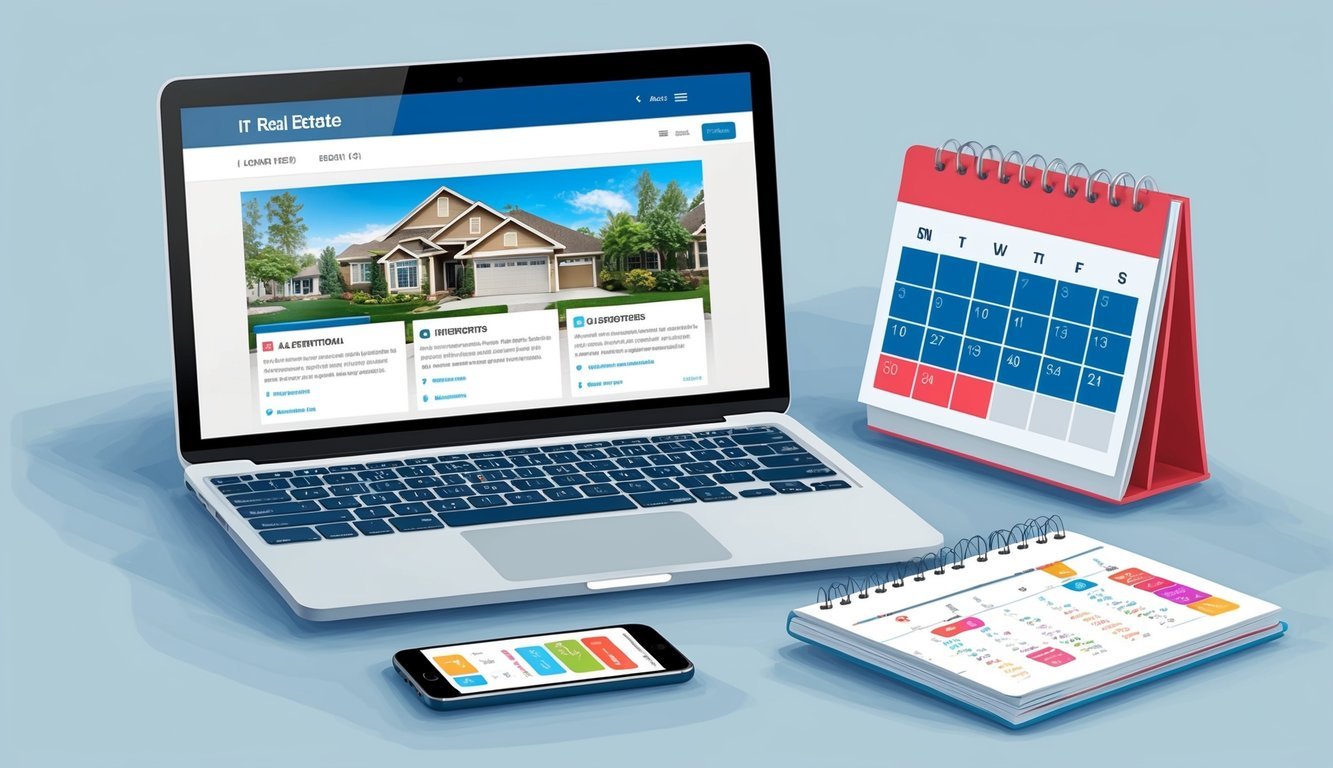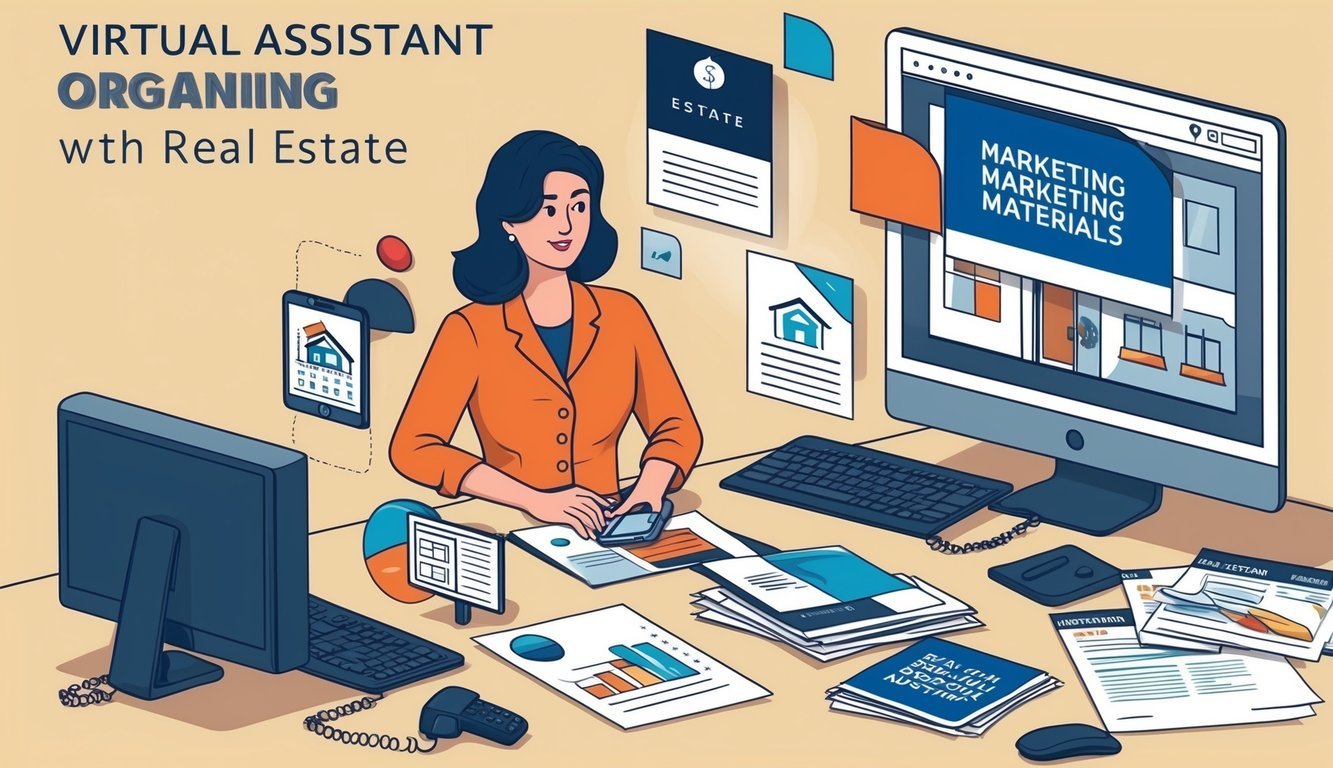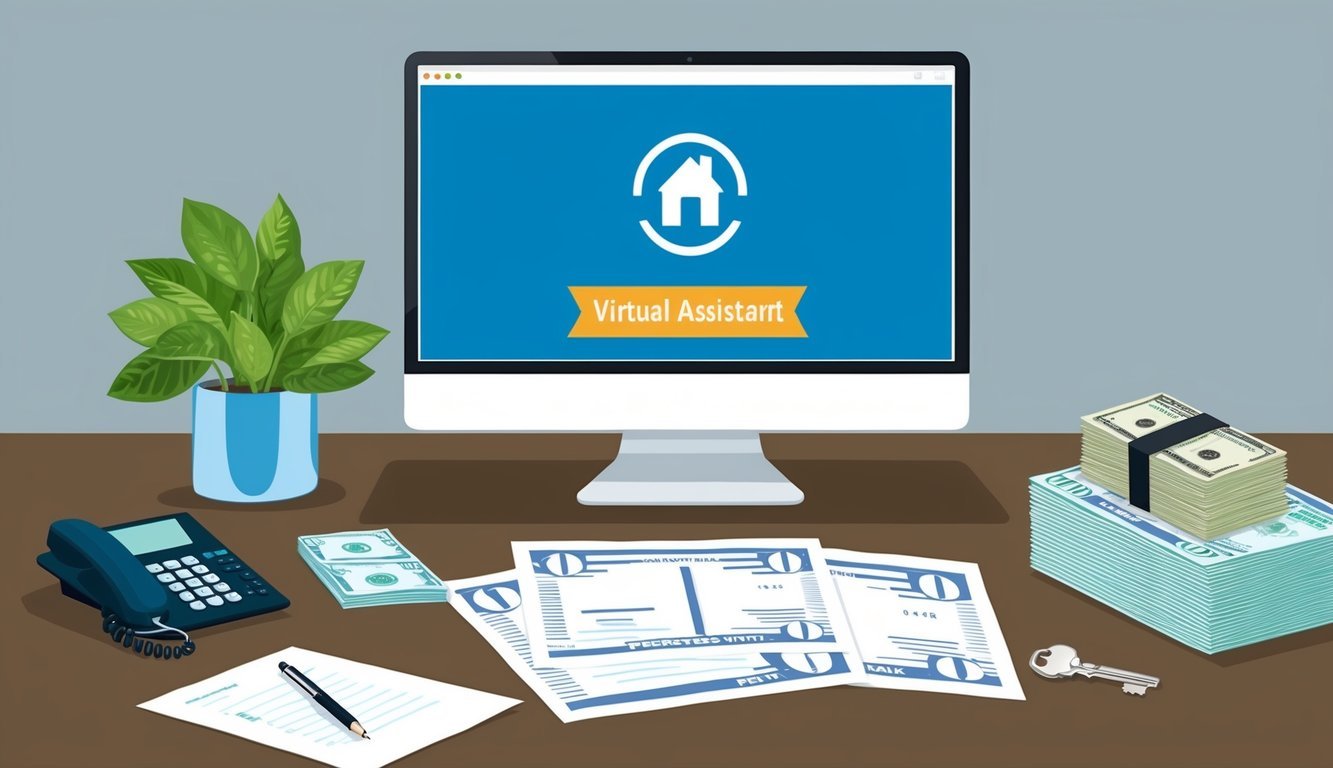Looking for a flexible way to earn extra income in the real estate industry? Becoming a real estate virtual assistant might be the perfect side hustle for you.
This role allows you to work remotely while supporting real estate professionals with various tasks, from administrative duties to marketing efforts.
As a real estate virtual assistant, you can leverage your organizational and communication skills to help busy agents and brokers manage their workload more efficiently. Your responsibilities may include scheduling appointments, managing emails, data entry, and even assisting with social media marketing.
The best part? You can often set your own hours and work from the comfort of your home.
To get started, you’ll need to build a professional portfolio showcasing your skills and experience.
This will help you make a great first impression on potential clients and demonstrate your ability to handle their tasks effectively.
As you gain experience and build your reputation, you may find opportunities to expand your services and increase your income in this growing field.
Key Takeaways
- Real estate virtual assistants provide remote support for agents and brokers
- You can start this side hustle with basic administrative and communication skills
- Building a strong portfolio is crucial for attracting clients and growing your business
Decoding the Real Estate Virtual Assistant Role
A real estate virtual assistant (VA) plays a crucial role in supporting real estate professionals remotely.
This position offers flexibility and diverse opportunities for those seeking a side hustle in the real estate industry.
The Diverse Responsibilities of a Virtual Assistant
As a real estate VA, you’ll handle a wide range of tasks.
You might be responsible for lead generation and customer follow-ups.
This involves reaching out to potential clients and maintaining relationships with existing ones.
Your duties may also include appointment scheduling and listing coordination.
You’ll manage the realtor’s calendar and ensure property listings are up-to-date across various platforms.
Marketing assistance is another key area.
You could create content for social media, design flyers, or manage email campaigns to promote properties and services.
Administrative tasks are a significant part of the job.
This encompasses data entry, document preparation, and transaction coordination.
Essential Skills for Virtual Assistant Success
To thrive as a real estate VA, you need a specific set of skills.
First, you need strong communication abilities.
You’ll interact with clients and colleagues remotely, so you must be a clear and effective communicator.
You should also be comfortable with digital tools like:
- Customer Relationship Management (CRM) software
- Social media platforms
- Productivity apps like Google Workspace or Microsoft Office
Organizational skills are vital, too.
You’ll juggle multiple tasks and deadlines, so being detail-oriented is key.
Basic knowledge of real estate principles and terminology will give you an edge.
Familiarize yourself with common industry terms and processes.
Adaptability is important as well.
The real estate market changes rapidly, and you’ll need to keep up with new trends and technologies.
Comparing Side Hustles: The Benefits of Real Estate VA
Becoming a real estate VA offers unique advantages compared to other side hustles.
You can work from home, saving time and money on commuting.
The job provides flexibility in terms of hours.
You can often set your own schedule, making it easier to balance with other commitments.
There’s potential for growth, too.
As you gain experience, you can specialize in areas like marketing or transaction coordination, increasing your value and earning potential.
Networking opportunities abound.
You’ll connect with real estate professionals, potentially opening doors to other opportunities in the industry.
The work is varied, which keeps things interesting.
One day you might be designing a property brochure, the next coordinating a closing.
Remote Work and Time Management in Real Estate Assistance
As a real estate VA, effective time management is crucial.
You’ll need to prioritize tasks and meet deadlines consistently.
Using time-tracking tools can help you stay productive.
Apps like RescueTime or Toggl can show where you’re spending your hours.
Creating a dedicated workspace at home is important.
It helps you maintain a professional mindset and minimizes distractions.
Set clear boundaries with clients regarding your availability.
This ensures you maintain a healthy work-life balance while meeting their needs.
Regular communication with your clients is key.
Use video calls or instant messaging to stay connected and address any issues promptly.
Getting Started as a Real Estate Virtual Assistant

Launching your career as a real estate virtual assistant requires a strong online presence, the right tools, and an efficient workspace.
These elements will set you up for success and help you attract clients in this competitive field.
Building Your Online Presence
Creating a professional online presence is crucial for attracting real estate clients.
Start by setting up a website that showcases your skills and services.
Use SEO techniques to improve your visibility in search results.
Leverage social media platforms like LinkedIn and Instagram to network with potential clients.
Share valuable content related to real estate and virtual assistance to establish yourself as an expert.
Consider creating a portfolio that highlights your experience and capabilities.
Include samples of your work, such as property listings you’ve managed or marketing materials you’ve created.
Don’t forget to optimize your profiles on freelance platforms like Upwork or Fiverr.
These can be great sources for finding your first clients.
Essential Tools and Software for Efficiency
To excel as a real estate virtual assistant, you’ll need a suite of tools to manage tasks efficiently.
Start with a robust Customer Relationship Management (CRM) system to track client interactions and property details.
Invest in project management software like Trello or Asana to organize tasks and collaborate with clients.
These tools help you stay on top of deadlines and prioritize work effectively.
For marketing tasks, familiarize yourself with Canva or Adobe Creative Suite.
These platforms allow you to create professional-looking flyers, social media posts, and property brochures.
Communication tools like Zoom or Skype are essential for virtual meetings with clients and property viewings.
Make sure you have a reliable video conferencing setup.
Setting Up Productive Workspaces
Creating a dedicated workspace is vital for maintaining productivity as a virtual assistant.
Choose a quiet area in your home with good lighting and minimal distractions.
Invest in a comfortable chair and an ergonomic desk setup to prevent fatigue during long work hours.
Consider a standing desk option to promote better posture and circulation.
Ensure you have a fast and reliable internet connection.
Consider a backup internet option, like a mobile hotspot, to avoid disruptions during important tasks or meetings.
Set up a professional background for video calls.
This could be a neat bookshelf or a plain wall with subtle decor.
It helps create a positive impression when interacting with clients virtually.
The Nitty-Gritty of Real Estate Business

Real estate is a complex and dynamic field with multiple players and moving parts.
As a virtual assistant, understanding the inner workings of this industry is crucial for providing valuable support.
Understanding Real Estate Agents’ Needs
Real estate agents are the frontline workers of the property market.
They juggle multiple tasks daily, from lead generation to closing deals.
As a virtual assistant, you’ll need to grasp their unique challenges.
Agents often need help with:
- Managing client databases
- Scheduling property viewings
- Creating and distributing marketing materials
- Responding to inquiries
You can assist real estate professionals by handling these tasks efficiently.
This allows agents to focus on what they do best – building relationships and closing deals.
Time management is crucial in this fast-paced environment.
You’ll need to be organized and responsive to keep up with the demands of busy agents.
The Role of Real Estate Investors
Real estate investors operate differently from agents.
They focus on purchasing properties for profit through resale or rental income.
Your role as a virtual assistant to investors might involve:
- Researching potential investment properties
- Analyzing market trends and property values
- Preparing financial reports and projections
- Coordinating with property managers
Investors often deal with large amounts of data.
You’ll need to be comfortable with spreadsheets and financial calculations to provide valuable support.
Communication skills are also vital.
You may need to liaise with banks, lawyers, and other professionals on behalf of your investor clients.
Insights into Property Management
Property management is a crucial aspect of real estate, especially for investors with multiple properties.
As a virtual assistant in this area, you might handle:
- Tenant screening and communication
- Rent collection and record-keeping
- Coordinating maintenance and repairs
- Creating financial reports for property owners
Property managers need to be detail-oriented and good at problem-solving.
You’ll often be the first point of contact for tenants, so excellent customer service skills are essential.
Technology plays a big role in modern property management.
Familiarize yourself with popular property management software to increase your value as a virtual assistant.
Marketing Strategies for Real Estate

Real estate marketing requires a multi-faceted approach to attract potential buyers and sellers.
By leveraging various digital platforms and communication methods, you can effectively showcase properties and build your brand.
Effective Use of Social Media Management
Social media is a powerful tool for real estate marketing.
You should focus on platforms like Instagram, Facebook, and LinkedIn to reach your target audience.
Post high-quality photos and virtual tours of your listings to grab attention.
Use hashtags strategically to increase visibility.
Create a consistent posting schedule to keep your followers engaged.
Share market updates, property tips, and behind-the-scenes content to add value for your audience.
Respond promptly to comments and messages to build relationships with potential clients.
Don’t forget to utilize paid advertising options on social media platforms.
These can help you target specific demographics and locations, increasing your chances of reaching interested buyers or sellers.
Creating Engaging Content for Real Estate Blogs
A well-maintained blog can establish you as an expert in your local real estate market.
Write about topics that interest your potential clients, such as home buying tips, neighborhood guides, and market trends.
Use keyword research to optimize your blog posts for search engines.
This will help your content rank higher in search results, attracting more organic traffic to your website.
Include visuals like infographics, charts, and videos to make your content more engaging.
These can help explain complex real estate concepts in an easy-to-understand format.
Regularly update your blog with fresh content to keep readers coming back.
You can also repurpose blog content for your social media channels, maximizing its reach and impact.
Email Marketing and Communication Skills
Email marketing remains an effective way to nurture leads and stay in touch with past clients.
Build an email list by offering valuable content, such as market reports or home maintenance tips, in exchange for subscribers’ contact information.
Segment your email list based on factors like buyer preferences or property types.
This allows you to send targeted, relevant content to different groups.
Craft compelling subject lines to improve open rates.
Keep your emails concise and focused on providing value to the recipient.
Include clear calls-to-action to encourage engagement.
Personalize your communications by addressing recipients by name and referencing their specific interests or past interactions.
This personal touch can help build stronger relationships with potential clients.
Specialized Real Estate Services
As a real estate virtual assistant, you can offer specialized services that set you apart from the competition.
These skills can help real estate professionals showcase properties more effectively and attract potential buyers.
Photography and Video Tours
You can provide high-quality photography and video tours to make listings stand out.
Learn to use professional cameras and editing software to capture properties in their best light.
Consider investing in a drone for aerial shots that give a comprehensive view of the property and surrounding area.
These visuals are crucial in today’s digital-first real estate market.
Create virtual tours using 360-degree cameras.
This allows potential buyers to explore properties remotely, saving time for both them and the real estate agent.
Offer to manage and update virtual tour platforms, ensuring that all listings have current and engaging visual content.
Home Staging and Interior Design
Your expertise in home staging can significantly impact a property’s appeal.
Learn to arrange furniture and decor to highlight a home’s best features and create an inviting atmosphere.
Develop relationships with local furniture rental companies to quickly stage empty properties.
This service can be especially valuable for high-end listings or in competitive markets.
Offer digital staging services using photo editing software.
This allows you to virtually furnish and decorate empty rooms, helping buyers visualize the space’s potential.
Provide color consultation and minor renovation advice to sellers looking to update their homes before listing.
Your guidance can increase a property’s value and attractiveness to potential buyers.
Expertise in Property Listings
Become proficient in creating compelling property descriptions that highlight unique features and selling points.
Use SEO techniques to ensure listings appear in relevant online searches.
Learn to use multiple listing services (MLS) effectively.
Keep listings up-to-date with accurate information, pricing changes, and status updates.
Offer to manage and optimize listings across various real estate platforms and social media channels.
This increases visibility and reaches a wider audience of potential buyers.
Develop skills in creating virtual open houses and live streaming property tours.
These services became essential during the pandemic and remain popular with out-of-town buyers.
Investment Opportunities and Client Support

Real estate virtual assistants play a crucial role in helping investors and property managers maximize their profits.
They handle various tasks related to investment ventures, house flipping, wholesaling, and short-term rentals.
Assisting with Real Estate Investment Ventures
As a real estate virtual assistant, you can help investors identify lucrative opportunities and manage their portfolios.
You’ll research market trends, analyze property values, and compile reports on potential investments.
Your duties may include:
- Screening properties that match investment criteria
- Preparing financial projections and cash flow analyses
- Coordinating with real estate agents and property managers
- Maintaining databases of investment properties and tenant information
By taking on these tasks, you free up your clients’ time to focus on making strategic decisions and closing deals.
Supporting House Flipping and Wholesaling
House flipping and wholesaling require meticulous organization and quick action.
As a virtual assistant, you’ll help real estate investors streamline these processes.
Your responsibilities might include:
- Researching distressed properties and foreclosures
- Creating marketing materials for potential buyers
- Coordinating with contractors and scheduling repairs
- Managing paperwork for property transfers and sales
You’ll need to be detail-oriented and comfortable working in a fast-paced environment.
Your support can make the difference between a profitable flip and a costly mistake.
Navigating Short-Term Rentals and Airbnb
The short-term rental market offers unique opportunities for investors.
As their virtual assistant, you’ll help manage properties and maximize occupancy rates.
Your tasks may include:
- Creating and updating listings on platforms like Airbnb
- Responding to guest inquiries and managing bookings
- Coordinating cleaning and maintenance services
- Monitoring reviews and addressing guest feedback
You’ll need excellent communication skills and the ability to handle multiple properties simultaneously.
By providing top-notch support, you’ll help your clients achieve higher ratings and increased bookings.
Financial Aspects of Real Estate Assistance

Real estate virtual assistants can be invaluable in managing financial tasks.
They help keep your finances organized and provide insights into property performance.
Bookkeeping Basics for Real Estate
As a real estate professional, you need accurate financial records.
A virtual assistant can handle your bookkeeping tasks, ensuring everything is up-to-date.
They’ll track income and expenses, categorize transactions, and reconcile accounts.
Your assistant can set up and maintain digital accounting systems.
This makes tax time less stressful and helps you stay compliant with regulations.
They’ll also manage invoices, both sending them to clients and paying your bills.
This keeps your cash flow smooth and prevents late fees.
Financial Reporting for Rental Properties
Rental properties require close financial monitoring.
Your virtual assistant can create regular reports to show how each property is performing.
They’ll track rent payments, late fees, and vacancies.
This helps you spot trends and make informed decisions about your investments.
Your assistant can prepare profit and loss statements for each property.
These reports show your income versus expenses, giving you a clear picture of profitability.
They can also help with budgeting for maintenance and improvements.
By analyzing past expenses, they’ll help you plan for future costs and set aside appropriate reserves.
Data Management and Administrative Duties

A Real Estate Virtual Assistant handles crucial data and administrative tasks.
These responsibilities form the backbone of efficient real estate operations, allowing agents to focus on client interactions and sales.
Mastering Data Entry for Real Estate
Data entry is a vital skill for Real Estate Virtual Assistants.
You’ll be responsible for inputting property details, client information, and transaction data into various systems.
Accuracy is key – a single mistyped digit can cause significant issues.
To excel in this area:
- Familiarize yourself with common real estate software like MLS and CRM systems
- Practice touch typing to improve speed and accuracy
- Double-check all entries before submission
- Learn shortcuts and efficient data entry techniques
Creating and maintaining spreadsheets for property listings, client databases, and financial records is also part of your role.
You’ll need to organize data in a clear, easily accessible format.
Efficiently Handling Administrative Tasks
As a Virtual Assistant in real estate, you’ll tackle a wide range of administrative duties.
These tasks keep the business running smoothly and free up the agent’s time for client-facing activities.
Your responsibilities may include:
- Managing calendars and scheduling appointments
- Coordinating property viewings and open houses
- Preparing and sending out contracts and documents
- Handling email correspondence and phone calls
- Filing and organizing digital and physical documents
To be effective, develop strong organizational skills and learn to prioritize tasks.
Time management is crucial – you’ll often juggle multiple assignments with varying deadlines.
Familiarity with digital tools like Google Workspace or Microsoft Office is essential.
These platforms will help you create professional documents, manage schedules, and collaborate effectively with your clients.
Growing Your Career

Advancing your real estate virtual assistant side hustle requires strategic expansion and continuous learning.
By diversifying your services and honing your skills, you’ll position yourself for long-term success in this dynamic field.
Expanding Your Services
Start by identifying complementary services you can offer to existing clients.
Consider adding social media management to your repertoire.
This natural extension allows you to handle clients’ online presence, boosting their visibility and yours.
Look into providing virtual tours for properties.
With the right equipment and know-how, you can help agents showcase homes remotely, tapping into a growing market need.
Explore offering transaction coordination services.
This valuable skill can set you apart and increase your earning potential.
Many agents gladly outsource this time-consuming task.
Continuous Learning and Skill Development
Stay ahead by investing in your professional development.
Take online courses in real estate trends, digital marketing, and customer relationship management (CRM) systems.
Attend virtual real estate conferences and webinars.
These events keep you informed about industry changes and networking opportunities.
Consider pursuing relevant certifications.
A Real Estate Virtual Assistant (REVA) certification can boost your credibility and attract higher-paying clients.
Practice using the latest real estate software and tools.
Familiarity with popular platforms like Zillow, Redfin, and MLS systems makes you more valuable to agents.
Success Stories and Inspirations
Real estate virtual assistant side hustles have transformed many careers.
Let’s explore some inspiring stories that might spark your own journey.
Sarah, a former administrative assistant, launched a successful VA business after having her first child.
She now enjoys the flexibility of working from home while supporting real estate professionals.
John, a realtor, hired a virtual assistant to handle his paperwork and scheduling.
This decision allowed him to focus on client interactions, resulting in a 30% increase in sales within six months.
Gina’s story is particularly impressive.
She started as a part-time virtual assistant while working full-time in finance.
Her side hustle grew into a 7-figure business offering VA courses and resources.
These success stories highlight the potential of real estate virtual assistant side hustles.
You could:
- Manage social media for realtors
- Handle property listings and updates
- Coordinate showings and open houses
- Assist with marketing campaigns
Remember, building a strong portfolio is crucial.
Showcase your skills and professionalism to make a great first impression on potential clients.
With dedication and the right skills, you too could turn this side hustle into a thriving career.
Frequently Asked Questions
Real estate virtual assistance offers flexible opportunities for those with administrative skills.
It allows you to support agents remotely while building a profitable side hustle.
How do I get started as a real estate virtual assistant?
To get started, build a professional portfolio showcasing your skills and experience.
Research the real estate industry to understand common tasks and terminology.
Network with real estate professionals online and through local organizations.
Create profiles on freelancing platforms to find initial clients.
What are the typical duties of a real estate virtual assistant?
Real estate virtual assistants often handle administrative tasks like scheduling appointments, managing databases, and responding to inquiries.
You may also assist with marketing efforts, social media management, and basic graphic design for listings.
Some virtual assistants help with transaction coordination, document preparation, and research on property listings or market trends.
Can you make good money as a real estate virtual assistant?
Rates for real estate virtual assistants vary widely based on experience and tasks performed.
In the U.S., virtual assistants typically earn between $15 to $45+ per hour.
As you gain experience and specialize in high-value tasks, you can increase your rates.
Building long-term relationships with clients can lead to steady, lucrative work.
What skills are needed to be effective in real estate virtual assistance?
Strong organizational and communication skills are essential.
Proficiency with common software like Microsoft Office, Google Workspace, and customer relationship management (CRM) tools is important.
Familiarity with real estate terminology and processes is valuable.
Skills in social media management, basic graphic design, and data entry can make you more marketable.
Are there opportunities for remote virtual assistant jobs with no prior experience?
Yes, entry-level opportunities exist for those new to real estate virtual assistance.
Many agents are willing to train assistants who demonstrate strong organizational and communication skills.
Start by offering basic administrative support and gradually take on more specialized tasks as you learn.
Consider taking online courses in real estate fundamentals to boost your knowledge.
How can I use virtual assistance to generate leads in real estate?
As a virtual assistant, you can help generate leads through various online strategies.
For example, you can manage social media accounts to engage potential clients and showcase listings.
Another strategy is to create and maintain email marketing campaigns to nurture leads.
You can also implement SMS marketing to improve response times and client satisfaction.
Lastly, you can research and compile lists of potential leads for your clients to contact.


